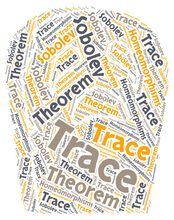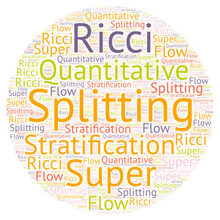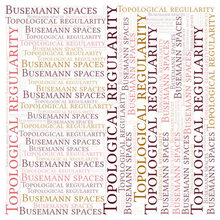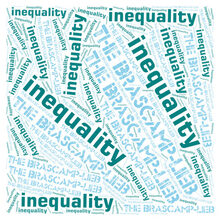Past Events
2026 Analysis on Metric Space Seminar: "P-Dirichlet spaces and the resolution of the resistance and energy image density conjectures" by Prof.Sylvester Eriksson-Bique, University of Jyv¨askyl¨a
2026-02-04Speaker: Sylvester Eriksson-Bique, University of Jyv¨askyl¨a
Title: P-Dirichlet spaces and the resolution of the resistance and energy image density conjectures
Abstract: I will describe the resolution of two conjectures related to Dirichlet forms. In both cases a conceptually simple solution arises by stepping away from the p=2 regime. This leads to a new definition of a p-Dirichlet space, which unifies three quite different areas: Dirichlet form theory, Analysis on fractals and Analysis on metric spaces. The talk includes joint work with Mathav Murugan
2026 Analysis on Metric Space Seminar: "The Trace Theorem for Sobolev Homeomorphisms" by Dr.Aleksis Koski, Aalto University
2026-02-04Speaker: Aleksis Koski, Aalto University
Title:The Trace Theorem for Sobolev Homeomorphisms
Abstract: Classical Sobolev trace theory tells us when a boundary map can be extended as a Sobolev function inside a given domain in R^n. For the purposes of minimization problems in Nonlinear Elasticity, it is natural to rephrase this question in the context of extending a given embedding of the boundary as a homeomorphic Sobolev map. In this talk, I will explain what is known about this problem, ending with a full trace theory for Sobolev homeomorphisms in 2D.
2026 Analysis on Metric Space Seminar: "Dynamic inverse problems regularized with Wasserstein-1 transport" by Dr.Julius Lohmann, Institute of Science Tokyo
2026-01-14Speaker:Julius Lohmann JSPS International Research Fellow, Institute of Science Tokyo
Title: Dynamic inverse problems regularized with Wasserstein-1 transport Julius Lohmann JSPS International Research Fellow, Institute of Science Tokyo
Abstract: The (classical, balanced) Wasserstein-p distance can be used as a measure of how close a source and sink mass distribution (with equal mass) are. In recent years, the Wasserstein-2 distance has been employed in the temporal regularization of dynamic inverse problems. The so-called Benamou–Brenier formula states that it can be written as the square root of the performed physical work through the transport from the source to the sink. In my talk, I will instead focus on dynamic inverse problems regularized with Wasserstein-1 transport. The Wasserstein-1 distance can be interpreted as the optimal transport cost with respect to the Euclidean distance: it equals infπ R |x−y|dπ(x, y), where measure element dπ(x, y) indicates the (infinitesimal) amount of mass moving from location x to y. I will explain a novel dynamic inverse problem on time-parameterized curves in the induced Wasserstein-1 (metric) space. It is a natural extension of static sparse optimization problems such as lasso or TV regularization. One essential difference to classical regularization with Wasserstein-2 transport is that it allows for discontinuous decision variables (realized as BV curves). Despite this weak regularity requirement and the non-differentiability of the cost function (x, y) 7→ |x − y|, it is possible to prove the existence of a sparse solution and its characterization. I will present this result. Further, I will detail an adaption of the fully-corrective generalized conditional gradient method to the problem and highlight a natural discretization approach. Finally, I will show some numerical examples. Joint work with: Marcello Carioni
2025 Analysis on Metric Space Seminar: "Almost splitting and quantitative stratification for super Ricci flow" by Professor Yohei Sakurai, Saitama University
2025-11-06Speaker: Professor Yohei Sakurai, Saitama University
Title: Almost splitting and quantitative stratification for super Ricci flow
Abstract:
I will discuss almost rigidity properties of super Ricci flow whose Muller quantity is non-negative.
I will present almost splitting and quantitative stratification theorems that have been established by Bamler for Ricci flow. This talk is based on the joint work with Keita Kunikawa (Tokushima university).
**ZOOM** Please register here
2025 Analysis on Metric Space Seminar: " Fluid structure interaction and Sobolev spaces on changing domains" by Professor Malte Kampschulte, Charles University
2025-09-09
Speaker: Professor Malte Kampschulte, Charles University in Prague.
Title: Fluid structure interaction and Sobolev spaces on changing domains
Abstract:
Dynamic interaction between fluids and solids occurs everywhere, from a fish swimming in the water to an airplane wing bending in the wind. When studying them, one of the key issues is that finding the domain on which the fluid equations are posed itself is part of the problem. Thus before we can apply all the standard machinery from PDE and the calculus of variations, we must first translate it to work on changing domains. The aim of this talk will be to explore precisely this. On one hand it will be an introduction into fluid structure interaction highlighting some recent results. On the other hand this will be used as an opportunity to illustrate and discuss several old and new methods on how to deal with Sobolev spaces when the domain itself is not fixed. This talk is based on results obtained with S.Schwarzacher and B.Benešová as well as work with N.Evseev and A.Menovschikov.
Analysis on Metric Spaces Seminar 2025 | Topological regularity of Busemann spaces, Professor Tadashi Fujioka, Kyoto University
2025-06-04Title: Topological regularity of Busemann spaces, Professor Tadashi Fujioka, Kyoto University
Abstract:
We discuss the topological regularity theorem for Busemann spaces of nonpositive curvature, while reviewing the corresponding results for Alexandrov spaces and CAT spaces. All of these are metric spaces with upper or lower curvature bounds in some synthetic senses, and we address the question of when such spaces are topological manifolds. This is joint work with Shijie Gu (Northeastern University, China). Preprint available at arXiv:2504.14455.
ZOOM
Register from here
Analysis on Metric Spaces Seminar 2025 | Periodic homogenization for non-local stable-like operators, Professor Takashi Kumagai, Waseda University
2025-02-19Periodic homogenization for non-local stable-like operators
Professor Takashi Kumagai Waseda University
Abstract :
Homogenization has been a very active area of research in both PDE and probability theory for many years. In this talk, we will first review classical results on periodic homogenization for divergence form operators. We will then present our recent results on periodic homogenization for non-local, stable-like operators. Both qualitative and quantitative results will be discussed. Moreover, we will explore quantitative periodic homogenization on bounded domains, where the rate of convergence near the boundary slows down
Analysis on Metric Spaces Seminar 2025 | Recent development in bilinear rough singular integrals, Professor Bae Jun Park Sungkyunkwan University, Suwon, South Korea
2025-01-22Analysis on Metric Spaces Seminar 2025
Speaker: Bae Jun Park, Sungkyunkwan University, Suwon, South Korea
Title: Recent development in bilinear rough singular integrals
Abstract:
In this talk we will study the Lp1 × Lp2 → Lp boundedness for bilinear rough singular
integral operators LΩ associated with Ω ∈ L(log L)α(S2n−1) with mean value zero. We
will first review classical linear singular integrals and then study how the results have been
extended and developed in the bilinear setting, presenting the most recent results. If time
permits, general multilinear problems will be also discussed
【Seminar】 The Brascamp-Lieb inequality | Professor Neal Bez, Saitama University
2024-05-29Speaker : Professor Neal Bez, Saitama University
Title : The Brascamp-Lieb Inequality
★Please click here to register
[Seminar] Growth estimates for \(p-\)harmonic Green functions on weighted \(R^n\) and metric spaces | Professor Jana Björn, Linköping University and OIST TSVP Visiting Scholar
2024-05-15Speaker: Professor Jana Björn, Linköping University and OIST TSVP Visiting Scholar
Title: The Dirichlet Problem and Boundary Regularity for Nonlinear Parabolic Equations












